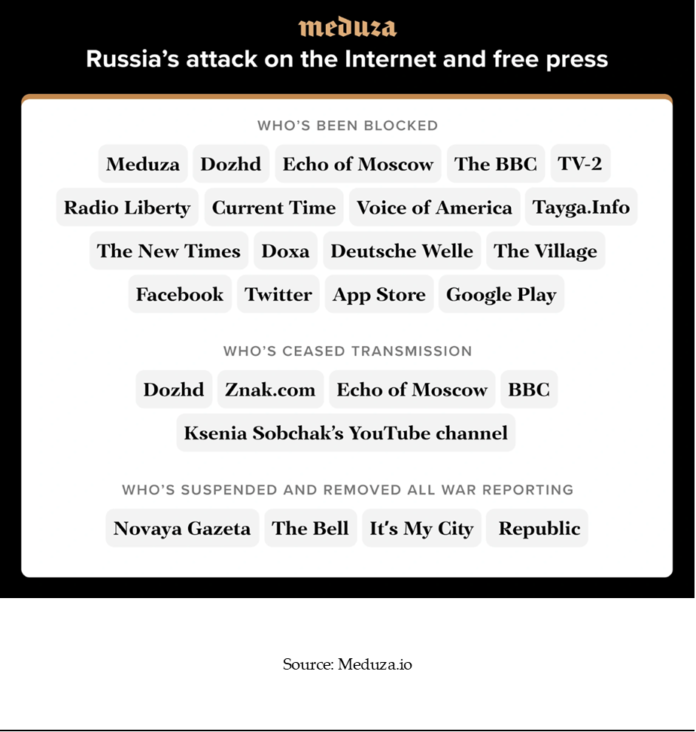By Nikolai Perebeinos
On April 24th, after the start of the invasion of Ukraine, Roskomnadzor, or Russian Federal Service for Supervision in the Sphere of Telecom, Information Technologies, and Mass Communications, threatened to block the media that spread fake news about the situation in Ukraine. A statement in which the regulator also called for the use of information only from official Russian sources was published on the official website of the agency. Roskomnadzor asked the media to not use the word “ war”, and use the words “ military operation”. This new policy is targeting independent media.
Novaya Gazeta, one of the biggest independent newspapers, and a few others stopped covering war with Ukraine to remain available, and limited access to its previous publications on this topic. Violation would result in a fine of up to 5 million rubles, or around $52,000 as of March 5th, 2022.
On March 1st liberal radio station Echo of Moscow was blocked from radio broadcasting in Russia by Roskomnadzor due to “purposeful and systematic publication of deliberately false information about the Russian military”. It continues to broadcast on its official youtube channel. This radio station got in a crossfire in informational warfare. Ironically their youtube channel was blocked for European users by Google from march 2nd to march 3rd due to the fact that it is partially owned by Gazprom Media Holding, a Russian government-owned media company. The board of directors voted to close the station on March 3rd. On March 4th the station ended the broadcast, and all of its social media accounts were deleted.
Echo of Moscow was not the only one who got targeted by restrictions. Roskmonzadzor blocked access to Russian commercial television channel Dozhd (TV Rain), which was already labeled as a “foreign agent” in august of 2021, over its coverage of the Ukraine invasion. Multiple employees fled Russia after they started to receive threats. On March 3 the team of the TV channel decided to temporarily stop the work of the channel. “We have made a decision for ourselves that we are temporarily suspending the work of the TV channel. I want to say that the word “temporary” is very important” – said founder and CEO of Dozhd Natalya Sindeyeva. During the last minutes of the broadcast employees left the studio saying “No to war”. Then they played Swan Lake like tv channels did during the collapse of the USSR.
Online newspaper Muduza.io was blocked the evening of March 3rd. According to Meduza’s website, “This means that we all need honest and timely news even more than before.” They were already classified as “foreign agents”, and some users reported issues using this website before the ban. Back in 2019 one of their journalists, Ivan Godunov, was arrested on drug charges after his corruption investigation. After public outcry in social media, massive support from journalists from both commercial and government-owned media, and personal involvement of Vladimir Putin he was released, and police officers who planted evidence against him were placed on leave and put under investigation.
Russian government-owned media also became subject to heavy censoring, this time from IT giants. Social media companies started putting warnings or banning official accounts of multiple news agencies. Websites of many government-owned media were under DDOS attack by Anonymous, a decentralized hacker group that declared cyberwar on Russia. Anonymous has a history of successful attacks on the Islamic State, Interpol, Church of Scientology, Chinese government websites, numerous child pornography websites, oil companies, the Israeli government, and the American government and companies after the arrest of the founder of WikiLeaks.
On March 4th, at the time of writing this article, some users reported the unavailability of access to BBC, Facebook, Twitter, Deutsche Well, Znak.com, Apple Store, and Google Play Store. A shutdown of app stores would mean that iOS users would be left without means to bypass restrictions with VPN, and this process of getting VPN apps would be significantly complicated for Android users. Roskomnadzor has officially confirmed the ban of Twitter and Facebook.
Note: Please keep in mind that these are current events, and things seem to change quickly. In this article I tried to stay out of politics as much as possible, mainly due to the overwhelming amount of propaganda, one-sided representation of the story, misinformation, and disinformation.

